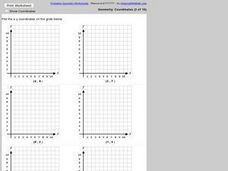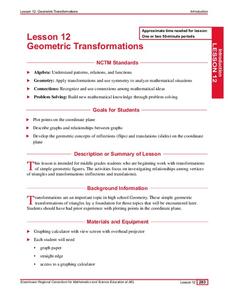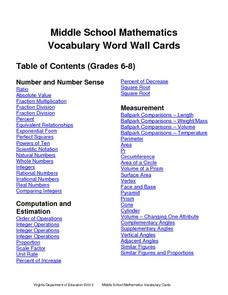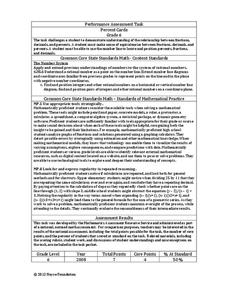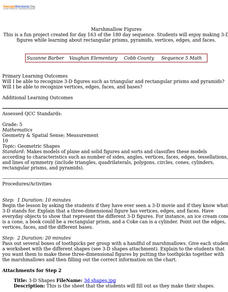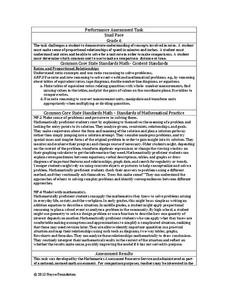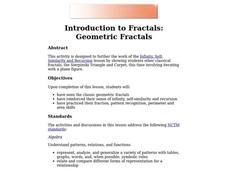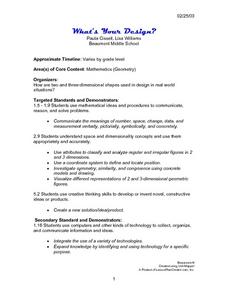Curated OER
Plotting Coordinates on a Grid
In this plotting points on a graph worksheet, students plot 6 points on 6 graphs. Students plot x and y-coordinates in the first quadrant.
Curated OER
Geometric Transformations
Pupils solve problems involving transformations of geometric figures. They review graphing points in the coordinate plain, plot points and connect to create a triangle. Then, they reflect triangles over the x and y axis and use graphing...
Curated OER
Does the falling tree make a sound if no one if there to hear it? (or communication via encryption)
Students explore encryption. They discuss the importance of cryptography in our daily lives. Students use games and cryptography to discover transformational geometry and modulo systems. They design their own encryption puzzles and...
Curated OER
It's Not All Greek to Me
Learners find out the meaning for prefixes used in math vocabulary. By dissecting words used in everyday math, they figure out what the prefix indicates and what the word means. A variety of well-organized worksheets and activities...
Virginia Department of Education
Middle School Mathematics Vocabulary Word Wall Cards
Having a good working knowledge of math vocabulary is so important for learners as they progress through different levels of mathematical learning. Here is 125 pages worth of wonderfully constructed vocabulary and concept review cards....
Shodor Education Foundation
Sets and the Venn Diagram (Beginner)
Venn diagrams are helpful in understanding the idea of a set and using attributes to sort items. This basic plan is an introduction with an added bonus of an applet that can be used to demonstrate the activity. If a classroom of...
Noyce Foundation
Percent Cards
Explore different representations of numbers. Scholars convert between fractions, decimals, and percents, and then use these conversions to plot the values on a horizontal number line.
Curated OER
Marshmallow Figures
Students enjoy making 3-D figures while learning about rectangular prisms, pyramids, vertices, edges, and faces. After a lecture/demo, students use marshmallows, toothpicks and a worksheet imbedded in this lesson to create 3 dimensional...
Curated OER
Supplementary, Complementary, and Vertical Angles
By using circles that they cut out and label themselves, learners literally "get a grip" on the angles they identify: supplementary, complementary, and vertical. They solve missing measurements based on properties of supplementary,...
Curated OER
Foil Fun
Second graders be having hands-on experiences with three-dimensional solid shapes. They investigate the features of solid shapes and examine the names for them. They are introduced to making nets for 3D shapes.
Oleh Yudin
iCrosss
Did you know that a soccer ball is very similar to a truncated icosahedron? Both have 32 faces, but while a truncated icosahedron is made up solely of flat hexagons, a traditional soccer ball has 12 pentagons and 20 hexagons, each curved...
Curated OER
2-D polygons
A hands-on activity uses the Zome modeling system, and helps young geometers either learn or review their knowledge of polygons. Pupils build as many different 2-dimensional polygons as possible: triangle, square, rectangle, pentagon,...
Noyce Foundation
Snail Pace
Slow and steady wins the race? In the assessment task, scholars calculate the rates at which different snails travel in order to find the fastest snail. Hopefully, your class will move much more quickly in finishing the task!
Curated OER
One Good Turn Deserves Another
Young scholars make observations about shapes and 1-, 2-, and 3-dimensional objects. They conduct observations and make predictions regarding transformations of simple geometric shapes. They identify shapes that occur in household items.
Curated OER
Adding Negative Numbers
In this integers worksheet, students solve 16 addition problems by adding two integers together. There is no answer...
Curated OER
Introduction to Fractals: Geometric Fractals
Students study and observe the patterns made by the areas of the Sierpinski Triangle. Students use the computer to draw two or three iterations to discover the number patterns. Students complete worksheets based on Geometric Fractals.
Curated OER
Identifying Lines: Horizontal, Vertical, and Oblique
Second graders identify horizontal, vertical, and oblique lines on a worksheet after learning them in class. They demonstrate a horizontal line with their arms while saying the word and use their arms with no talking to demonstrate...
Curated OER
How Many?
In this measurement learning exercise, students complete a 12 question multiple choice online interactive assessment about standard modern and ancient measurement.
Curated OER
Transformations-Shapes on the Move
Students examine transformations. In this math lesson, students view and describe flips, slides, and turns. Students practice making transformations with shapes.
Curated OER
Lines and Angles
Sixth graders explore lines and angles. They create visual representations of lines, rays and angles by drawing them on paper and using a geoboard. On paper, 6th graders write a summary of the characteristics of their representations.
Curated OER
Terrific Tessellations
Students explore tessellations that are found in nature and everyday objects. They observe the works of M.C. Escher. Students create their own tessellations using pencil and paper.
Curated OER
What's Your Design?
Sixth grade middle schoolers: design a stained glass window, submitting their initial plan detailing the measurements of all lines and angles. Seventh grade students: create a scale drawing of their own geometric family of four members.
Curated OER
Shapes Around Us
Students create posters about geometric shapes in order to demonstrate their understanding of the different shapes. Students look for pictures in magazines to represent two-dimensional shapes, paste them on a poster, label the shape,...
Curated OER
Fold and Cut
Second graders explore line symmetry and the names and attributes of two-dimensional mathematical shapes. They study the context by folding and cutting out shapes to make a series of mathematical shapes.
Other popular searches
- Coordinate Plane Geometry
- Plane Geometry Symmetry
- Point Line Plane Geometry
- Plane Geometry Shapes
- Plane Geometry Second Grade
- Plane Geometry and Theorems
- Plane Geometry Area
- Plane Geometry Symmetry 3d
- Plane Geometry Twelve
- Plane Geometry Middle Point
- Plane Geometry Symmetry 3
- Geometry Coordinate Graph


